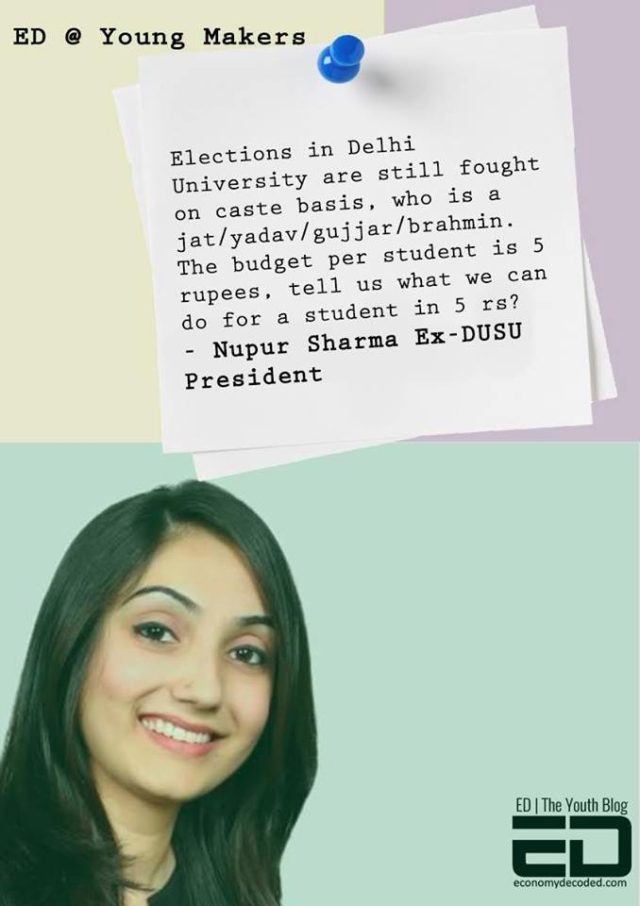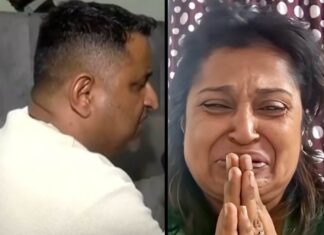This week on Friendly Fridays we got a chance to interview Nupur Sharma, who is more than just a politician from BJP and former President of Delhi University Students Union. She is passionate about her work, ambitious for her political career and all for encouraging a higher participation rate of the youth in the politics of India.
Let’s hear what she has to say.
ED: When BJP first came into power, they introduced us to the Swachh Bharat Abhiyan with a lot of pomp and optimism, even involving celebrities. But it hasn’t been integrated in the college space – the campus is littered with pamphlets during elections. What exactly went wrong?
Nupur: So, quite honestly, the Swachh Bharat campaign is not solely meant for the government to pursue. Instead, it spreads awareness about what we need to be responsible towards. Every media channel has its own version of the Swachch Bharat campaign. There is consistent work of the government behind it. It is to send across a message that if you are a part of society, you are responsible for the mess you create. ABVP had strictly asked people to not throw pamphlets in the air because what you thrown above comes back to the ground. It is not only the karamchaaris who are responsible. Campaigners are also equally responsible because they are creating this mess. In MCD, there is a sanitization act, and they have come up with a clause which imposes a penalty of 50 supees if you litter, but it has been pending with the Delhi government for five years. Swachch Bharat is not a campaign meant only for campuses, infact many schools have taken this initiative.
There was an effort by the HRD minister to involve all the staff and faculty in this campaign. There are so many efforts being made. Swachch Bharat is a collective initiative. People have to step up together. It is not as if this is not being practiced in colleges. Campuses get littered by the students. Since there is no law against it because of the Delhi government, we can only be responsible – don’t litter and do not let others litter.
This is the gist of Swachch Bharat – we are responsible for the environment we live in.
ED: Speaking of elections, when you came for the Young Nations’ Conclave, that as President of Delhi University Students Union you get a very small budget, like 5 rupees. How do you ensure that all the promises are delivered?
Nupur: There is a limit to committee restrictions that says not more than Rs. 5,000 should be the budget. Elections have become more decentralized now, because it is impossible for candidates to reach all 52 colleges of Delhi University. You have to raise money through sponsors, because events do require more money that we are granted. For example, there was a problem of solar lamps and streetlights in girls’ colleges. We allotted that duty to private players so that they can take care of the expenditure. Honestly, sometimes, in DU, it is observed that infrastructural facilities are left at the behest of colleges themselves, but ABVP worked towards betterment of every college.
ED: I have observed that a lot of people who are involved in college elections are involved in national politics. Are college elections just a stepping stones for national politics?
Nupur: It is a wrong assumption that all of them join. There are four posts that somebody or the other wins every time. How many have you really seen in national politics? In the past six years, you are only talking about say, 6 people who have been involved in national politics.
College elections, however, should be stepping stones for national politics. We have always seen politicians parachuted in the eyes of the public, emerging because of dynastic politics. College politics helps debunks that myth.
Delhi University does not enjoy unwanted interruptions, like AAP last year because they could not connect with the college people.
ED: Are the student politicians really fighting for student issues?
Nupur: Most definitely. FYUP was rolled back not because there was a change in government but because of the rigorous protests organised by ABVP. Satyender Awana sat on a hunger strike for 15-20 days because of the rift between the BAR Council and Faculty of Law. 2310 seats were reduced to 1440 seats. Due to this rift, the counselling session was pushed back indefinitely. 900 students were saved because of this protest.
ED: How much truth is behind the supposed implication of casting couch in politics – has it always been there? If so, has it increased or decreased?
Nupur: Rumours, frankly. There is always some loose talk behind your back. Nobody wants to see your talent. There is more truth to gossipping than reality. BJP’s culture is such that people look at me as a daughter. We are like a family.
There is a Kamal Sakhi Manch where non-politicians from political integrity to get together and mingle with each other. There is a strong sense of family that BJP really has. I have heard a lot of rubbish about my female colleagues, but over years I have realised to not be bothered by them.
ED: Coming on to the next question, you said that there is no casteism in politics.
Nupur: No, no. It does not exist within the party, but it exists in electoral politics. The Congress has ruled for the maximum number of years in India but hasn’t been able to diminish the caste divides.
Casteism is very prevalent in DUSU elections. Student voters do vote for the caste of their candidate.
ED: There is this popular notion that BJP is not letting the party work. AAP ministers have been arrested on multiple occasions, and the general rumours that the police is not co-operating. What do you have to say about this?
Nupur: Just because he is using your hard-earned money that you give in taxes to plaster the city with billboards, it doesn’t speak the truth about the work that he has been doing. I deny all of it, and it is an impression that he has successfully created. If he really knew his work, he would’ve been here, handling the dengue and chikungunya situation because health is a primary subject in Delhi. The health minister was in Goa doing what? They don’t want to work, simply.
ED: What are some dirty secrets of the politics?
Nupur: Yaar aisa hai, dirty secret nai but perhaps the dirtiest secret is that this life is not an easy life, and people need to stop believe that we live such charmed lives. In fact it is a sure shot road map to a heart attack, whether in power or not. There is judgment and prejudices that we have to endure. Ye field aasan nai hai, it is a lot of hard work, lot of compromises and how much social life can you have. If you want to enter politics then you have to make a conscious decision whether you want to be in politics, it cannot be on a whim or fancy.
ED: We also wanted to know what your thoughts are on the double standards set by hostels in DU, where girls hostels have a curfew of 9.30 while there being no such thing for the boys hostel. Recently a DU college’s Dean came out with a very interesting rule, where he put a curfew for the boys hostel too. Do you think this is something that will work?
Nupur: Technically there was always a curfew for students in hostels, it was instead flouted. See, usually curfew for girls is not moral policing, it is basically a safety measure. But this rule that the college dean has taken is a very good thing that they have done, so I absolutely welcome it and I would just say one thing what Modi ji said on the independence day, he said ‘ask not where your girls are going, ask where your boys are going’ because that’s where actually the problem and all the danger to safety and security of women starts from in the 1st place. So I think this is a most welcome step and if I relate it to what the prime minister meant, ladko se poocho wo kahan jaa rahe hai, ladkio se nai. Ladkiya ye sab bahar jaake nai karti, ladke karte hai, jis se crime rate itna zyada hai.
But on the other hand, there should be certain discipline I think in college hostels. Students should be more responsible as young citizens.
And while not in favour of absolute curfew, but admit it is needed for safety and precautionary purposes. It also largely depends on where you are living and what the circumstances in that area are.
ED: A little bit of a light question, but exactly how popular is the Rahul Gandhi= pappu joke, in the BJP party?
Nupur: *laughter* Very. There is an inside joke that the more he speaks the better it is for us.
ED: Last question, by our understanding, when Rahul Gandhi first came on to the political scene, he was not this obtuse shall we say. We want to know your opinion, on the theory that is Rahul Gandhi, using his dumbness as a political tactic, or is he truly this dumb?
Nupur: I don’t think it is that way. That might also be the case with Arvind Kejriwal, and people might talk about him, but will it translate to votes? While I think this ‘khoon ki dalali’ might have been done to remain alive in the public eye, but in turn it has dented India to such an extent that any mature intelligent person is like ‘ise nai ho payega’.
ED: Would love it if you could give our ED readers a message.
Nupur: The times have changed and I want to say this to all the youngsters who are reading this, to always take that risk. It is no longer that time when you earn till you are 50 and then spend all your money later. You cannot lead an unhappy life anymore. But always always take a calculated risk, and if you have belief in your abilities, then you can definitely work out your dreams. Do what you dream, what you love, initially it might not be easy, but it will all fall into place if you truly believe in your talent.
Other Recommendations:
http://edtimes.in/2016/09/friendly-fridays-sumukhi-suresh/
http://edtimes.in/2015/12/friendly-fridays-chapter-54-india-today-editor-kaveree-bamzai/
http://edtimes.in/2013/10/aam-admi-party-worth-voting-power/



































